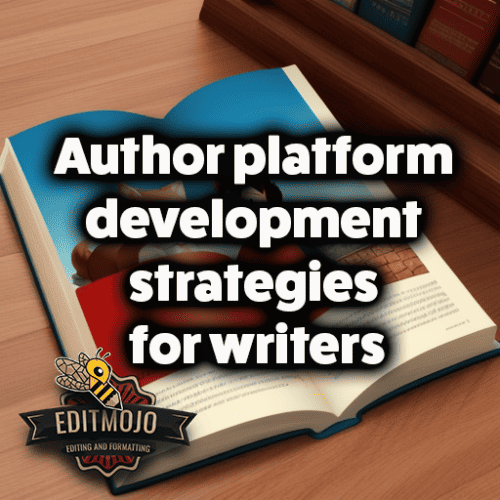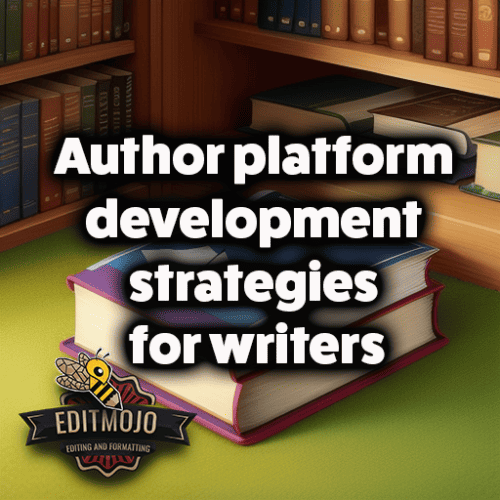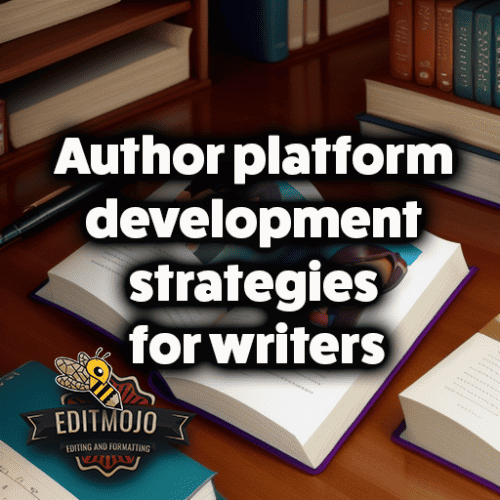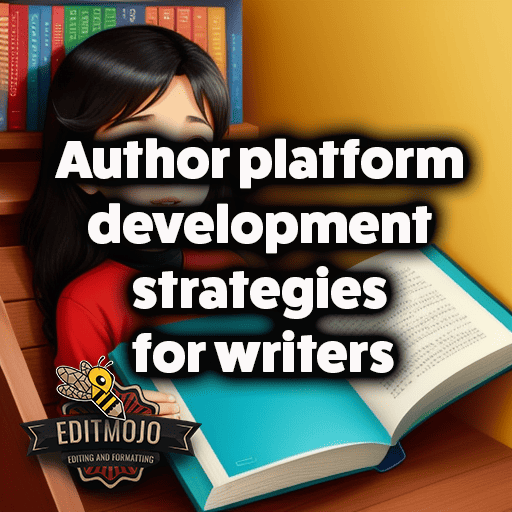Author platform development strategies for writers
Author platform development strategies for writers. Writing is a craft that demands a curious mix of solitude and sociability. While authors need seclusion to birth creative ideas, they must also navigate the busy marketplace of readers and industry players. That’s where the concept of an “Author Platform” becomes paramount. So, what is an author platform, and why does every writer need one? This post will delve into these questions and provide a roadmap for developing your very own compelling author platform.
Key Takeaways
| Section | Key Takeaways |
|---|---|
| Understanding an Author Platform | An author platform is your professional presence in the world, helping to establish a direct line of communication with your audience. |
| Importance of Branding | Personal branding is critical for creating an authentic and relatable presence. It’s about expressing your unique voice and identity across your platform. |
| Website and Blog Creation | An author’s website is the online home where readers and industry contacts can learn about you and your work. A blog is an essential component for thought leadership and reader engagement. |
| Email Marketing Strategies | Email is a powerful tool for direct communication with your loyal readers. Building an engaging email list is key to a successful author platform. |
| Utilizing Social Media | Social media platforms help in engaging with your audience informally. Tailoring your content for each platform can help in building anticipation for upcoming releases. |
| Leveraging Podcasts and YouTube | Diversifying your platform through podcasts and YouTube allows you to reach audiences in a more intimate format. |
| Collaborative Strategies | Building relationships through guest posts, partnerships, and networking is essential for developing a strong author platform. |
| Managing and Measuring Success | Regular monitoring and adapting your platform’s strategies based on feedback and performance metrics is important for growth. |
| Case Studies of Successful Author Platforms | Studying strategies of successful author platforms can provide valuable lessons for your own platform development journey. |
Understanding an Author Platform
Imagine standing in a vast sea of authors, each vying for attention. How do you rise above the noise? An author platform is the answer. It’s the means to establish a direct line of communication with your audience, inviting them into your world and engaging them with your unique perspective. Essentially, it’s your professional presence in the world—your website, social media profiles, email newsletters, blog posts, podcasts, and more.
The Need for an Author Platform
In a crowded literary marketplace, having a platform can make all the difference. It helps you create a loyal reader base, which is critical when launching a new book. It also piques the interest of agents and publishers, demonstrating that you are not only a talented writer but also a savvy marketer.

The Importance of Branding in Author Platform
Just as every story you write is unique, so too should be your author platform. It’s a reflection of your identity and your work, which is why personal branding is so critical.
Your Unique Voice and Identity
Creating a brand is about more than choosing a fancy logo or a catchy tagline—it’s about authenticity. Readers crave authenticity; they want to know the person behind the pages. Sharing your journey, your insights, and your quirks helps create a strong bond with your audience. Your voice should permeate every facet of your platform, from your website’s design to your social media posts.
Website and Blog Creation for Writers
Having a dedicated author website is a non-negotiable part of platform building. It’s your online home, the place where interested readers, industry contacts, and the media can learn more about you and your work.
Key Elements to Include on an Author’s Website
Consider your author website as your virtual business card. It should include your bio, a showcase of your books with links to purchase them, a contact form, and your blog. If you’re an aspiring author, you can highlight your writing journey, upcoming projects, and any relevant writing achievements.
Creating a blog as part of your website can help improve your site’s SEO, and it provides an opportunity for readers to engage with you and your thoughts on a more personal level. For SEO strategies, check out resources like Moz’s Beginners Guide to SEO.

Email Marketing Strategies for Authors
Email might seem a little old-school in the age of social media, but it’s actually one of the most potent tools at your disposal. Your email list is a direct line to your most loyal readers—those who want to hear from you and are likely to support your future work.
Building and Growing Your Email List
Encourage readers to subscribe to your newsletter by offering an incentive—a free short story, a chapter from your upcoming book, or exclusive behind-the-scenes content are all attractive propositions. Remember, the key to successful email marketing is providing value. Mailchimp’s guide to email marketing provides a wealth of knowledge on this topic.
Utilizing Social Media Platforms
Social media is a crucial part of any author platform, providing a space to engage with your audience on a more informal level. It’s a place to share updates, offer sneak peeks into your writing process, and build anticipation for upcoming releases.
Choosing and Tailoring Content for Each Platform
It’s important not to spread yourself too thin. Choose two or three platforms where your target audience hangs out. If your book is a YA novel, you might choose Instagram and TikTok. If it’s a business book, LinkedIn and Twitter could be your best bet.
Leveraging Podcasts and YouTube for Brand Exposure
Diversification is a golden rule for any successful platform. Podcasts and YouTube can be significant assets, enabling you to reach audiences in a different, more intimate format.

Content Ideas for Podcasts and YouTube
Think about ways to provide value to your audience. You could share writing tips, discuss your research process, or interview other authors. Jenna Moreci’s YouTube channel offers excellent examples of content that appeals to both readers and writers.
Collaborative Strategies: Guest Posts, Partnerships, and Networking
Building an author platform isn’t just about broadcasting—it’s about building relationships.
Guest Posting and Networking
Guest posting on popular blogs can expose you to a wider audience. Attending writing conferences and workshops can also help you meet fellow writers, industry experts, and potential readers. Don’t underestimate the power of a robust network in the writing world.
Managing and Measuring Success of Your Author Platform
Building an author platform isn’t an overnight job—it’s a gradual process that needs patience and persistence. Tools like Google Analytics for your website, email marketing analytics, and social media insights can help you understand what’s working and what needs improvement.
Maintaining Balance
While it’s essential to dedicate time and effort to your platform, don’t let it overshadow your writing. After all, the primary reason you’re building this platform is to share your writing with the world.
Case Studies of Successful Author Platforms
Authors like Neil Gaiman and J.K. Rowling have leveraged their platforms brilliantly. They engage their readers regularly, not just when promoting a new book. Studying their strategies can offer valuable lessons.
Conclusion: Developing a Sustainable and Evolving Author Platform
Building an author platform is a marathon, not a sprint. It requires constant learning, adaptation, and genuine passion for connecting with your readers. But the payoff—having a dedicated reader base waiting eagerly for your next release—is well worth the effort.
Final Thoughts (Author platform development strategies for writers)
As writers, we pour our hearts into our books. An author platform allows us to share our passion with the world. It might seem intimidating at first, but step by step, post by post, you’ll see your platform grow. So start building today, and watch as the world falls in love with your stories.
Top Five Questions and Answers
1. What is an author platform?
An author platform is a writer’s professional presence, a combination of personal branding, social media, websites, blogs, podcasts, and more. It helps authors establish a direct line of communication with their audience and differentiates them in a crowded marketplace.
2. Why is an author platform important?
An author platform helps create a loyal reader base, which is vital when launching a new book. It also shows agents and publishers that you are both a talented writer and a savvy marketer.
3. How can I grow my email list?
You can grow your email list by offering an incentive to subscribe, such as a free short story, a chapter from your upcoming book, or exclusive behind-the-scenes content. The key to successful email marketing is providing consistent value to your subscribers.
4. How can I use social media to enhance my author platform?
Choose two or three social media platforms that are popular with your target audience. Share regular updates, offer sneak peeks into your writing process, and build anticipation for upcoming releases.
5. How can I measure the success of my author platform?
Use tools like Google Analytics for your website, email marketing analytics, and social media insights to monitor your platform’s performance. Regular assessment can help you understand what strategies are working and which need improvement.
